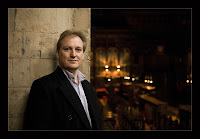 |
| Alexander Levine |
This liturgy is the most commonly observed of the Byzantium rite. The anaphora (Eucharistic prayer) is attributed to Saint John Chrysostom, who was the Archbishop of Constantinople in the 5th century. This work is Levin’s tribute to his friend Alexander Vladimirovich Men (1935 – 1990) a Russian orthodox priest who was murdered on his way to church. Men’s controversial ideas about ecumenicalism were honoured in tonight’s choice of venue - the 12th century priory church of St Bartholomew the Great in the City of London. St Bartholomew was also killed for his beliefs.
 |
| Nigel Short |
In all, 22 movements encompass the prayers, antiphons, hymns
and responses of the Litany as well as core segments including Hymn to the
Lord, Creed, Hymn to the Virgin, and Lord ’s Prayer. As a whole the work
felt very familiar whilst being entirely new.
Several refrains held everything together. Sustained notes,
sometimes beginning a new thought, sometimes linking or ending ideas, brought a
meditative quality, while (to a non-Russian speaker) the Amin and Alliluyas
provided a reference point. Cleverly Levine set this up from the very start
where the chant-like bass solo is answered by a choral Amin. This in turn
expanded, ever louder under ethereal held notes, until the word ‘grace’ when
the sound returned to a whisper.
The Second Antiphon was underscored by a delightfully
intertwining duet, first sung by the men and then appearing in various guises,
twisting under the rest of the chorus. Here deep notes in both male and female
voices suggested Russian folk or hymn tradition.
Waves of sound crashed in the Entrance Hymn, returning
several times, including in the ‘Fervent Supplication’ which ended
triumphantly, and Anaphora. Contrastingly in Cherybic Hymn the held notes
were refined to such a point that they reminded me of a finger on a wet glass.
But this was balanced against the more earthly King of All which was
dancelike although it ended sadly. Similarly the Communion was poised against
the folk dance and dark moments in the Hymn of praise.
Running about 10 minutes longer than the suggested 70
minutes the short interval was welcome – after all this was a concert
performance and not a service. Tenebrae made the Liturgy sound effortless,
bringing a clarity and depth of sound, which belied the technical difficulties
of such close singing. However this piece deserves to become a much performed
edition to the choral repertoire.
There is a video about the launch with an interview with the composer on YoutTube.
Elsewhere on this blog:There is a video about the launch with an interview with the composer on YoutTube.
review by Hilary Glover
- Madrigali dell'Estate - Stephen McNeff - CD review
- Old and New - Tallis Scholars 40th birthday concert
- Haflidi Hallgrimsson choral works - CD review
- Louise Alder recital at Lied in London
- Written on Skin - CD review
- Cosi fan tutte - ETO at Hackney Empire
- Al Combate - CD review
- Le Nozze di Figaro at Guildhall Schoool
- Jamie Walton in Dvorak and Schumann - CD review
- Khojaly 613 - Never Forgotten - concert review
- Home











No comments:
Post a Comment